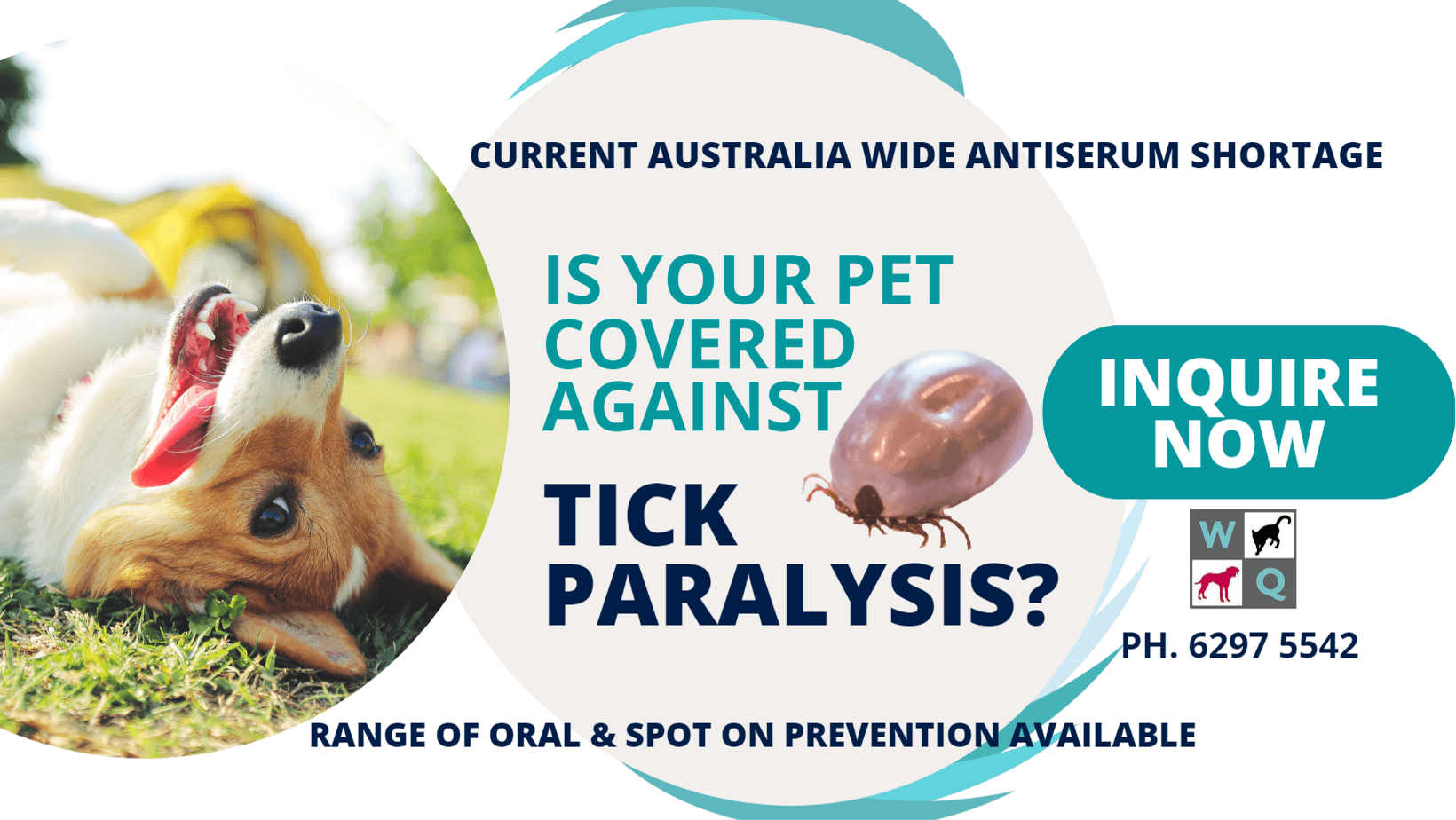Parasite Control
Regular worming is an essential part of good pet ownership. Intestinal worms live in the gastrointestinal system of cats and dogs and include hookworm, roundworm, whipworm and tapeworm. They can cause severe diarrhoea and disease, especially in puppies and kittens.
Usually worming is done with a simple tablet. Call us to find out what products we recommend.
Don’t forget about you! It is just as important for your own health and safety, to keep yourself and family regularly wormed.
Phone: (02) 6297 5542
Mon - Fri: 8:00am - 6pm
Saturday: 8:30am - 2:00pm
Our Recommended Canine Worming Schedule
Regular worming is important to protect not only your dog from the negative health effects of internal parasites but also you and your family.
| Life Stage | Vaccination Ages | Frequency | Recommended Products | Protection Against |
| Puppyhood | 2 – 10 weeks of age | Every 2 weeks | Cazitel Troy Puppy & Kitten Syrup |
Intestinal worms |
| 3 – 6 months of age | Monthly | Milbemax | Intestinal worms and heartworm | |
| Adolescence, Adulthood, and Senior years
|
From 6 months of age, for life | Every 3 months | Drontal & Yearly Heartworm Injection Cazitel & Yearly Heartworm Injection |
Intestinal worms and heartworm |
| Monthly or every 6 weeks | Milbemax | Intestinal worms and heartworm |
Recommended Rural Dog Worming Schedule
In this area this means anywhere outside of suburban Canberra/Queanbeyan where scavenging is possible – such as Wamboin, Burra, Carwoola, Captains Flat, Yass etc. Anywhere near where sheep once grazed that is now populated by either wild dogs or kangaroos.
| Life Stage | Vaccination Ages | Frequency | Recommended Products | Protection Against |
| Puppyhood | As directed above | |||
| Adolescence, Adulthood, and Senior years |
From 6 months of age, for life | Alternate – given every 6 weeks | Milbemax, Drontal or Cazitel | Hydatid tapeworm, flea tapeworm, roundworm, hookworm, and whipworm |
| Paratak Tape wormer | Hydatid tapeworm and flea tapeworm |
|||
Our Recommended Feline Worming Schedule
Cats and kittens are susceptible to intestinal worms and should be wormed regularly. A ‘pot-bellied’ appearance may indicate that your kitten has worms. Regularly worming your cat, ensures you and your family do not contract intestinal worms, by reducing the build-up of worm eggs in your home.
| Life Stage | Vaccination Ages | Frequency | Recommended Products | Protection Against |
| Kittenhood to adolescence | From 6 weeks – up to 2kg | Given every 2 weeks | Milbemax Kitten or Troy Puppy & Kitten Syrup |
Intestinal Worms |
| Adolescent – for life
|
From 2kg, for life | Given every 3 months | Milbemax Cat or Popantel |
Intestinal Worms |
Do not be alarmed if you find dead/dying worms in your felines faeces-this is a good sign! Your felines worming treatment is working. Remember to wash your hands after cleaning out litter trays.
Heartworm is the disease that nightmares are made of! Spread by mosquitoes, the worms can grow up to 30cm long and become lodged in your dog’s heart, eventually causing heart failure and death.
Prevention of heartworm is one of the most important things you must do for your dog – curing heartworm is rarely successful. Note that intestinal “all wormer” tablets do NOT protect against heartworm.
At West Queanbeyan Veterinary Hospital we recommend an annual Heartworm Injection for your dog to protect against heartworm, or alternatively by using Milbemax worming tablet, which is given monthly.
Fleas
Fleas are the MOST COMMON external parasite we find on dogs and cats. They cause intense itching and hair loss, and may also trigger skin allergies or transmit other parasites to your dog.
Flea prevention involves a monthly spot on treatment or oral tablet – call us to make sure you use the right product. BEWARE as pyrethrin-based flea treatments are toxic to cats.
Paralysis Ticks
The dreaded paralysis tick is unfortunately common all along the east coast of Australia. Once a tick attaches to your pet’s skin it becomes engorged with blood and injects a potent toxin that causes muscle paralysis – left untreated this can cause death if the muscles that help your pet breathe become paralysed, or the heart is affected (the heart is also a muscle).
Come in and discuss the best treatment for your pet, with one of our team.

